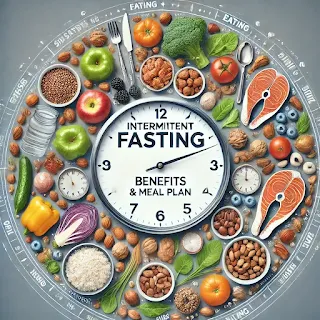Intermittent Fasting: Benefits and Meal Plan
Intermittent fasting (IF) is a popular eating pattern that alternates between periods of eating and fasting. It is not about what you eat but when you eat, making it a flexible and effective approach for weight management and overall health.
Benefits of Intermittent Fasting
1. Aids in Weight Loss
Intermittent fasting helps reduce calorie intake by limiting eating to specific hours. It also boosts metabolism and promotes fat burning by enhancing hormone function.
2. Improves Insulin Sensitivity
By reducing insulin levels, intermittent fasting helps improve insulin sensitivity, reducing the risk of type 2 diabetes.
3. Supports Heart Health
Fasting can lower blood pressure, cholesterol levels, and inflammation, all of which contribute to a healthier heart.
4. Enhances Brain Function
Intermittent fasting may increase brain-derived neurotrophic factor (BDNF), a protein linked to improved cognitive function and reduced risk of neurodegenerative diseases.
5. Promotes Cellular Repair and Longevity
During fasting periods, the body initiates autophagy, a process that removes damaged cells and regenerates new ones, potentially increasing lifespan.
Popular Intermittent Fasting Methods
1. 16/8 Method
Fasting Window: 16 hours
Eating Window: 8 hours (e.g., 12 PM - 8 PM)
Best For: Beginners, easy to sustain long-term
2. 5:2 Diet
Fasting Days: 2 non-consecutive days per week
Caloric Intake on Fasting Days: 500-600 calories
Best For: People who prefer structured fasting days
3. Eat-Stop-Eat
Fasting Window: 24 hours, once or twice per week
Best For: Experienced fasters looking for a challenge
4. Alternate-Day Fasting
Fasting Window: Every other day
Best For: Advanced fasters, effective for rapid weight loss
5. Warrior Diet
Fasting Window: 20 hours
Eating Window: 4 hours (usually one large meal at night)
Best For: Those who prefer eating one large meal a day
Intermittent Fasting Meal Plan
Meal Plan for 16/8 Method
12:00 PM (Lunch)
Grilled chicken or tofu with quinoa and steamed vegetables
A handful of almonds or walnuts
3:00 PM (Snack)
Greek yogurt with berries and honey
A boiled egg or a protein smoothie
7:30 PM (Dinner)
Grilled salmon with brown rice and roasted vegetables
Herbal tea or infused water
Meal Plan for 5:2 Diet (Fasting Day - 500-600 Calories)
Breakfast: Scrambled egg whites with spinach (150 calories)
Lunch: Mixed greens with grilled chicken and vinaigrette (200 calories)
Dinner: Vegetable soup with lentils (250 calories)
Tips for Success with Intermittent Fasting
Stay Hydrated: Drink plenty of water, herbal tea, or black coffee during fasting periods.
Start Gradually: Begin with a shorter fasting window and increase as your body adjusts.
Eat Nutrient-Dense Foods: Focus on whole, unprocessed foods to maximize health benefits.
Avoid Overeating: Don’t compensate for fasting periods by binge eating.
Listen to Your Body: If you feel fatigued or unwell, adjust your fasting schedule accordingly.
Conclusion
Intermittent fasting is a powerful tool for improving overall health, managing weight, and enhancing mental clarity. By choosing the right fasting method and following a balanced meal plan, you can successfully integrate IF into your lifestyle.
Related Keywords: intermittent fasting benefits, intermittent fasting meal plan, 16/8 fasting, best intermittent fasting method, fasting for weight loss, fasting and metabolism, how to start intermittent fasting, intermittent fasting for beginners, fasting schedule, healthy fasting meal plan, intermittent fasting for diabetes, fasting and brain health, fasting diet, autophagy benefits, intermittent fasting success tips.





